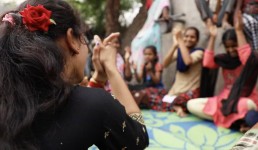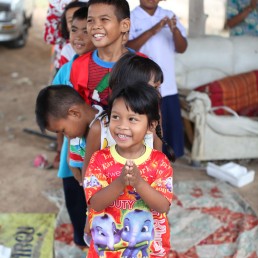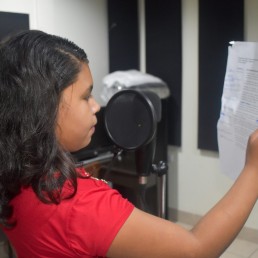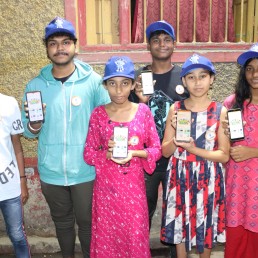Protecting children from violence and exploitation
A. Child labour and its worst forms
1. India | Empowerment For GOOD | Terre des Hommes Netherlands

Getting Out Of Devadasi system (GOOD) club activities
©Tdh/Akhila Kishori
The Indian Devadasi System in lower caste communities exploits young girls and women in the name of a harmful tradition. These girls and women are destined to a life of forced sex work. Young girls from the community are isolated, face stigma and drop out of school. Generations of women in the same family undergo these challenges: the daughter of a mother in the Devadasi-system often faces the same fate.
Through the GOOD (Getting Out Of Devadasi system) project, Terre des Hommes Netherlands works to change the mindset of the community towards the system, and empower its victims. Children are encouraged to join clubs where they are taught their rights and entitlements. Young girls also undergo life skills training to build their self esteem, confidence and resilience. The children are further facilitated to advocate for their concerns both at the community and the government level. Capacity building of the concerned authorities, media awareness, access to education and vocational training are the other important components of this project.
Amrita is a teenager who belongs to a socio-economically disadvantaged Devadasi community in North Karnataka, India where young girls and women are forced into a life of sex work as part of a societal norm. When her mother contracted HIV, Amrita had to drop out of school as they both immediately had no means of livelihood. Being from an ostracised community only made it worse.
Through Terre des Hommes, she was introduced to a children’s club where she realised that her rights as a child were being violated. She, along with other members of the club, raised their voice against injustice meted out to Devadasis. They even helped prevent a child from being forced into sex work. Amrita was also re-admitted to school and enrolled in a vocational training programme. Today, Amrita is a secondary school graduate and is championing the cause of Devadasi girls in her village.
I now have the confidence which I did not have before. I know that I am just like any other children and have access to the same rights. Our community’s children do not deserve to go through exploitation. I will do my best to spread awareness and ensure that my community is protected,
Another major administrative challenge faced was the mandatory requirement for Devadasi children to fill in their father’s name in application forms which created barriers for children as many of them don’t know their father’s identity. This meant that Devadasi children could not go to school. To tackle this, Terre des Hommes organised conversations with the state Minister of Women and Child and Social Welfare Department. This resulted in a government decision to make the father’s name optional on school application forms which enabled children to complete school.
The Terre des Hommes team has been successful in improving government relations, specifically with respect to building ties with high-ranking officials. This relationship building has led to a positive and noticeable shift in the response of government authorities as in the case of making the father’s name optional. They are more proactive in reporting cases and initiating action against issues faced by children from the Devadasi community.
Thanks to programs like GOOD, children like Amrita have a chance to be independent and happy.
Read more about Amrita’s story here.
‘Tales of Girl Power!‘ is a publication that captures stories about the success and impact of building the resilience of girls in the Devadasi system.
B. Child safety online and offline
1. Asia, Latin America | Down to Zero Pushes For the Elimination of Sexual Exploitation of Children | Terre des Hommes Netherlands

Child and youth participants in the Down to Zero program. ©Tdh
Millions of children around the world are sexually exploited, both online and offline. And this number continues to grow yearly. The physical and mental impact of sexual exploitation is great and long-term.
The Step Up the Fight Against Sexual Exploitation of Children (SUFASEC) project led by the Down to Zero Alliance enables children and young people to stand up for their rights, supports communities to become safer and protect their children from sexual exploitation, and helps governments to improve and implement relevant policies, laws and regulations. The Alliance also cooperates with activists, parents, schools, governments, and the private sector, for example in the tourism sector.
Children and young people are the main stakeholders of the programme and are often very active in organising, but need to be more recognised and heard in society.
If parents are more aware and talk to their children about the online risks, they will be more prepared to react in such situations.
Research titled VOICE or “Values, Opinions, and Insights from Children (and their Caregivers) about E-safety” was conducted on behalf of the Alliance to identify the safety needs of and solutions for children online. The research consulted a total of 316 children through focus groups discussions and surveyed 6,618 caregivers from 15 countries.
The research led by ECPAT International, Eurochild and Terre des Hommes Netherlands and supported by Terre des Hommes Italy and Terre des Hommes Lausanne launched the early findings in November 2023. One of the insights is that parents and caregivers experience challenges in talking with children about online sexual abuse. The final report will be launched in 2024.
Children and youth were engaged through tailored training and support provided by mentors. The mentors built trust and guided the children to develop tools, collect and analyse data and create a final country-specific baseline product providing a profound idea of the context these children and youth are living in.
For many children, this experience enhanced their self awareness and self esteem, and in particular, how they perceived their own agency, power and influence. The process was very motivating and encouraging and the Alliance is considering further expanding this approach to additional countries for the end-line evaluation.
The Alliance is led by Terre des Hommes Netherlands, Plan International NL, Defence for Children – ECPAT, Free a Girl, Child Rights Coalition Asia and Conexión with the Dutch Ministry of Foreign Affairs. It covers 12 countries including Bangladesh, India, Indonesia, Nepal, Philippines, Thailand, Laos, Brazil, Bolivia, Colombia, Dominican Republic and Guatemala. Read more about the research and projects here (in Dutch).
2. Nicaragua | Empowering Youth: Preventing Teenage Pregnancies through Sexual Health | Terre des Hommes Schweiz

Idania at her radio technology course in Nicaragua. (c)Tdh
Nicaragua records one of the highest rates of teenage pregnancies worldwide, and violence against girls and women is an everyday reality. Through this project, Terre des Hommes Schweiz contributes to the holistic development of youth, strengthens their right to a life free from violence, and supports the practice of safe, self-determined sexuality.
We need to understand that violence is not good, because it harms both current and future generations.
Idania is a bright 12-year-old girl from the community of San Pedro. Idania, along with her brother and her mother, lives with her grandparents, uncle, and cousins. Her parents have only recently separated, and her relationship with her father is strained, marked by episodes of domestic violence.
In Nicaragua, gender-based violence is deeply rooted due to the prevailing machista culture. Idania often feels unsafe in her community, reports being harassed on the street, and knows several girls who have become pregnant early, either through violence or a lack of knowledge about contraception. Young people lack access to safe information about sexual health and rights. While at home, these topics are often taboo.
In 2022, Terre des Hommes Schweiz, together with the organisation MIRIAM, launched a project to protect young people from teenage pregnancies through sex education and strengthening their awareness of their rights.
The leaders give me and the other girls the feeling that we are valuablel, simply because of who we are. That we have good reasons to be proud of ourselves. Nobody had told me that before,
Idania soon joined the project and felt like she was in good hands. The team paid close attention to her needs and integrated her into several activities.
I’ve become much more self-confident and no longer feel ashamed,
Idania is particularly enthusiastic about the communication and radio technology course, where she produces radio programs with other young people on topics such as violence and teenage pregnancies. Her family supports her participation in the project, hopeful that it will lead to a better future.
So far, 22 young people have produced and broadcasted 10 radio programmes on the prevention of teenage pregnancies.
Idania shares what she has learned with her friends:
I motivate them to fight for what is important to them. That we can achieve our dreams if we focus on them.
Idania herself wants to become a lawyer to help the community, especially women who suffer from violence.
In 2023, this project provided psycho-legal support to 204 young people, strengthened family relations between 103 young people and children as well as 35 family members. Also, 10 leaders spoke publicly about the intolerance of gender-based violence and stressed the importance of preventing teenage pregnancy.
Read more about the project here.
3. India | RoboMitra Sheds Light on Taboos | Terre des Hommes Lausanne

Children demonstrating the RoboMitra app. (c)Tdh
Child sexual abuse remains a harsh reality for millions of children in India, with many cases going unreported due to fear. Children may not fully comprehend the nature of the acts inflicted upon them, and may also face intimidation from their abusers. The resulting trauma can have long-lasting effects on their lives, as they often are not aware of or have access to mental health and psychosocial support services.
To address this issue, the RAKSHA Project has developed the RoboMitra application, which provides safety information to children, helping them reduce the risk of child sexual abuse and seek support if an incident occurs, all while maintaining their anonymity. The application aims to create a safe space for the disclosure of child and youth sexual abuse.
Additionally, the chatbot in RoboMitra supports the mental well-being of adolescents, providing healing services and support.
The app assists adolescents in tracking their menstrual cycle and dispels myths and misconceptions, promoting improved menstrual hygiene.
Menstruation is one of those issues on which we do not get proper information from any reliable source,
Geeta belongs to a minoritised community in West Bengal, India and was involved in the development of the RoboMitra app.
It also facilitates the sharing of details about mental health specialists or therapists, allowing children to access specialised mental health support services. Being involved in the process has also changed Geeta’s thinking about her future.
Although there is a practice in our community of marrying off girls at a young age, I want to continue my higher studies. After using RoboMitra App, I understand that girls should not be married at a young age. I want to pursue my career as a nurse.
Through the project, 966 children and members of their communities were supported. 66% of the children were girls. Geeta had been involved from the very initial stage of the RoboMitra app developing process and is an active user among 279 other trial users in Berhampore, India.
